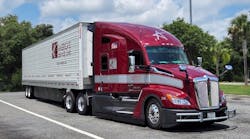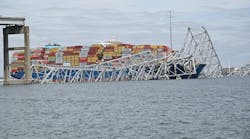Truck purchases will continue to drop throughout 2009 due to overcapacity, and the first and second quarter will be incredibly difficult on fleets’ bottom lines, trucking industry analysts said today during an FTR Associates webinar.
“This recession, from a freight standpoint, started almost three years ago,” said Noel Perry, managing director of FTR Consulting. “There is a free fall right now, but it is also the effect of cumulative stress on the industry…We have such low capacity, as low as we’ve had since the 1970s—nobody working in the industry right now has experienced these levels.”
While some carriers did not see the effects of the recession on their fourth-quarter earnings-- partially due to a cash boost thanks to diesel prices dropping so quickly--Perry said that the negative effects will show up in 2009 first-quarter earnings and even more so in the second quarter, with a disproportionate number of small- and medium-fleets continuing to go bankrupt.
Truck purchases will continue to drop throughout 2009 due to overcapacity, and the first and second quarter will be incredibly difficult on fleets’ bottom lines, trucking industry analysts said today during an FTR Associates webinar.
“This recession, from a freight standpoint, started almost three years ago,” said Noel Perry, managing director of FTR Consulting. “There is a free fall right now, but it is also the effect of cumulative stress on the industry…We have such low capacity, as low as we’ve had since the 1970s—nobody working in the industry right now has experienced these levels.”
While some carriers did not see the effects of the recession on their fourth-quarter earnings-- partially due to a cash boost thanks to diesel prices dropping so quickly--Perry said that the negative effects will show up in 2009 first-quarter earnings and even more so in the second quarter, with a disproportionate number of small- and medium-fleets continuing to go bankrupt.
“The gap between low- and high-risk fleets is huge,” Perry said. “In downturns, large fleets tend to do better than small fleets because they have cash reserves, and most large fleets entered this recession with a lot in reserve.”
According to Bill Witte, economist and co-director of the Center for Econometric Model Research, there is no sign that the housing market is about to hit bottom. And while he projected in October that unemployment would peak at 7.2% and 2 million jobs lost, we’ve already reached 2.6-million unemployed. “If you look at the last three months, it’s hard to find much to be joyous about,” he said.
Eric Starks, president of FTR Associates, said that there is currently a significant overbuy in both Class 8 and trailer purchases, which will lead to some kind of payback in 2011 and 2012. FTR projects monthly Class 8 sales in 2009 to be about 135,000—although Starks thinks more recent data indicates that may be too high—and trailers at 87,500 and dropping. Medium-duty is also incredibly weak, he said.
Starks said that under FTR’s worst case scenario, Class 8 sales would average about 95,000 a month in 2009, although he could conceive it going even lower. There was only a monthly average of 119,000 Class 8 vehicles sold in the fourth quarter, with 104,000 in December, so it’s very conceivable it could continue to drop, he said.
According to Starks, this is a result of several factors:
- Imports have dropped substantially, with orders from Mexico basically disappearing completely.
- Average age of vehicles is increasing, and could overtake its all-time high from 1992 sometime between 2010 and 2012.
- The size of fleets is shrinking, down 8% in 2008, so some old trucks are just not being replaced at all.
- Backlogs fell 18% in the U.S. in 2008, with non-U.S. backlogs down 62%.
However, all this doesn’t mean the freight that is available is going to another mode of transportation. “A lot of people were predicting a strong move from truck to rail, and to date we have no evidence of any move to either side,” Perry said. “There has been some movement from truckload to intermodal, but those gains disappeared when diesel prices dropped.”




